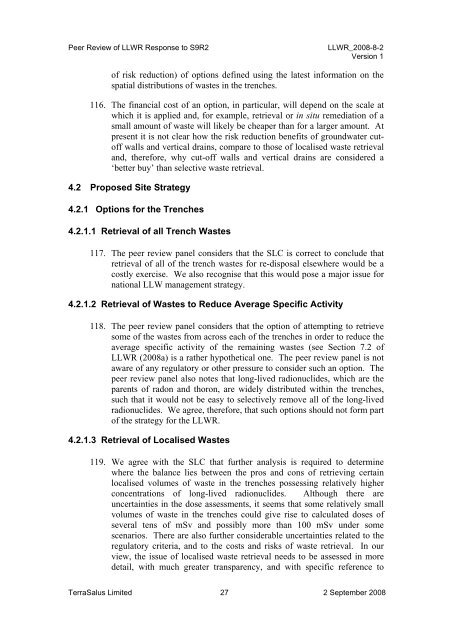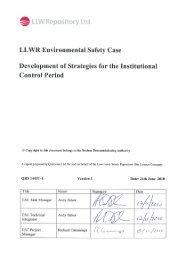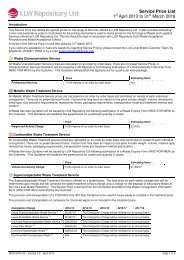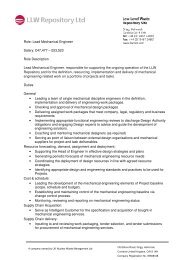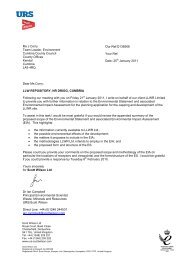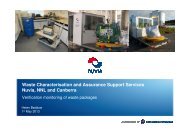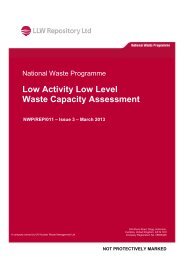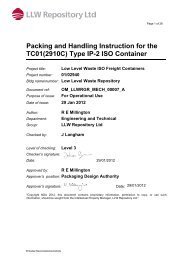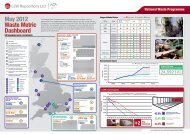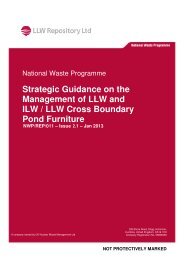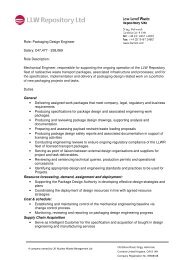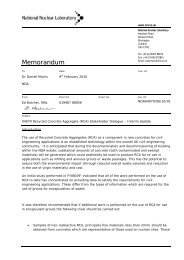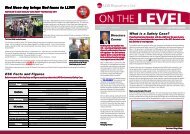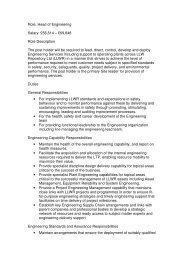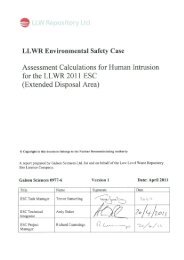Independent Peer Review of - Low Level Waste Repository Ltd
Independent Peer Review of - Low Level Waste Repository Ltd
Independent Peer Review of - Low Level Waste Repository Ltd
You also want an ePaper? Increase the reach of your titles
YUMPU automatically turns print PDFs into web optimized ePapers that Google loves.
<strong>Peer</strong> <strong>Review</strong> <strong>of</strong> LLWR Response to S9R2LLWR_2008-8-2Version 1<strong>of</strong> risk reduction) <strong>of</strong> options defined using the latest information on thespatial distributions <strong>of</strong> wastes in the trenches.116. The financial cost <strong>of</strong> an option, in particular, will depend on the scale atwhich it is applied and, for example, retrieval or in situ remediation <strong>of</strong> asmall amount <strong>of</strong> waste will likely be cheaper than for a larger amount. Atpresent it is not clear how the risk reduction benefits <strong>of</strong> groundwater cut<strong>of</strong>fwalls and vertical drains, compare to those <strong>of</strong> localised waste retrievaland, therefore, why cut-<strong>of</strong>f walls and vertical drains are considered a‘better buy’ than selective waste retrieval.4.2 Proposed Site Strategy4.2.1 Options for the Trenches4.2.1.1 Retrieval <strong>of</strong> all Trench <strong>Waste</strong>s117. The peer review panel considers that the SLC is correct to conclude thatretrieval <strong>of</strong> all <strong>of</strong> the trench wastes for re-disposal elsewhere would be acostly exercise. We also recognise that this would pose a major issue fornational LLW management strategy.4.2.1.2 Retrieval <strong>of</strong> <strong>Waste</strong>s to Reduce Average Specific Activity118. The peer review panel considers that the option <strong>of</strong> attempting to retrievesome <strong>of</strong> the wastes from across each <strong>of</strong> the trenches in order to reduce theaverage specific activity <strong>of</strong> the remaining wastes (see Section 7.2 <strong>of</strong>LLWR (2008a) is a rather hypothetical one. The peer review panel is notaware <strong>of</strong> any regulatory or other pressure to consider such an option. Thepeer review panel also notes that long-lived radionuclides, which are theparents <strong>of</strong> radon and thoron, are widely distributed within the trenches,such that it would not be easy to selectively remove all <strong>of</strong> the long-livedradionuclides. We agree, therefore, that such options should not form part<strong>of</strong> the strategy for the LLWR.4.2.1.3 Retrieval <strong>of</strong> Localised <strong>Waste</strong>s119. We agree with the SLC that further analysis is required to determinewhere the balance lies between the pros and cons <strong>of</strong> retrieving certainlocalised volumes <strong>of</strong> waste in the trenches possessing relatively higherconcentrations <strong>of</strong> long-lived radionuclides. Although there areuncertainties in the dose assessments, it seems that some relatively smallvolumes <strong>of</strong> waste in the trenches could give rise to calculated doses <strong>of</strong>several tens <strong>of</strong> mSv and possibly more than 100 mSv under somescenarios. There are also further considerable uncertainties related to theregulatory criteria, and to the costs and risks <strong>of</strong> waste retrieval. In ourview, the issue <strong>of</strong> localised waste retrieval needs to be assessed in moredetail, with much greater transparency, and with specific reference toTerraSalus Limited 27 2 September 2008


